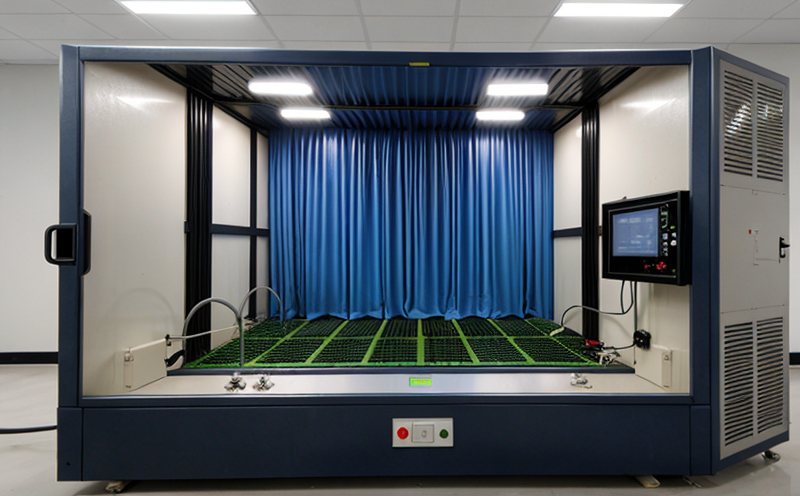RTCA DO 160 Section 12 Low Pressure Altitude Simulation Test
The RTCA DO-160 standard is a cornerstone in the aerospace industry, providing guidelines for environmental testing to ensure electronic equipment and avionics are robust against harsh operational conditions. Section 12 specifically addresses low pressure altitude simulation tests, which are crucial for assessing how devices perform at high altitudes where air pressure decreases significantly.
The test aims to replicate the effects of reduced atmospheric pressure on electrical components and assemblies used in aircraft. This is particularly important because many avionics systems must function correctly even when operating at extreme elevations, such as those encountered during cruise flight or while climbing through layers of the atmosphere with varying pressures.
At Eurolab, our facility is equipped with state-of-the-art altitude chambers capable of simulating a wide range of atmospheric conditions. Our engineers have extensive experience in preparing and testing specimens according to RTCA DO-160 specifications, ensuring that your products meet all necessary criteria for safe and reliable operation.
The process begins by carefully selecting the appropriate altitude level based on the intended use of the device or system being tested. For instance, if a particular aircraft model operates up to 41,000 feet (approximately 12,500 meters), then we would simulate an environment at that height where atmospheric pressure is about one-third of sea level.
During testing, various parameters are monitored continuously including temperature, humidity, and air pressure within the chamber. These conditions closely mimic those found in real-world environments to provide accurate performance data under simulated low-pressure scenarios.
Once completed successfully, this test provides valuable insights into potential failure modes associated with operating at high altitudes. It helps identify any weaknesses early on so manufacturers can address them before mass production begins or modifications are made during design phases.
By adhering strictly to RTCA DO-160 Section 12 standards, we ensure that our testing results are credible and internationally recognized by industry stakeholders. Compliance with these regulations not only enhances product quality but also supports regulatory approvals necessary for market entry into global markets.
- Customer Impact: Ensures products meet stringent requirements before reaching end-users ensuring reliability and safety in extreme conditions.
- Satisfaction: Provides peace of mind knowing that your electronics have been rigorously tested to withstand challenging environmental factors.
- Economic Benefits: Saves costs associated with rework or recalls due to failures caused by inadequate testing early in the development cycle.
Eurolab Advantages
At Eurolab, we pride ourselves on offering unparalleled services tailored specifically towards meeting your unique needs within the aerospace and defense sectors. With years of experience behind us, our team comprises highly skilled professionals who understand both technical nuances as well as business requirements.
We utilize advanced technology that allows for precise control over environmental parameters during testing ensuring accurate results every time. Our state-of-the-art facilities are designed to meet stringent industry standards, providing a secure environment where you can be confident about the integrity of your tests.
Our commitment extends beyond just performing tests; we also offer comprehensive analysis and reporting services which help our clients make informed decisions based on factual data rather than guesswork. This approach ensures that any necessary improvements are identified early so adjustments can be made promptly without compromising quality or timelines.
In summary, choosing Eurolab means accessing cutting-edge technology combined with expert knowledge in a collaborative setting aimed at achieving optimal outcomes for our clients' products and projects.
Customer Impact and Satisfaction
The RTCA DO-160 Section 12 Low Pressure Altitude Simulation Test has far-reaching impacts on customer satisfaction and business success. By ensuring that electronic devices meet the stringent requirements set forth by this standard, manufacturers can be confident their products will perform reliably under extreme conditions.
- Enhanced Product Quality: Rigorous testing leads to better product quality which translates directly into higher customer satisfaction levels.
- Increased Market Share: Meeting these standards often opens up new markets where compliance is mandatory, thereby expanding your customer base.
- Better Reputation: Demonstrating adherence to internationally recognized standards enhances your company’s reputation among potential clients and partners.
In summary, investing in RTCA DO-160 Section 12 testing not only satisfies regulatory requirements but also strengthens your competitive edge by delivering superior products that meet or exceed expectations.
Environmental and Sustainability Contributions
The work we do at Eurolab contributes positively to environmental sustainability efforts in several ways. By helping our clients develop robust electronics capable of functioning effectively even under challenging conditions, we reduce the likelihood of premature failures leading to increased waste.
In addition, through our commitment to accuracy and efficiency during testing, we minimize resource consumption such as electricity and raw materials which might otherwise be wasted if tests were performed incorrectly or inefficiently.
Our focus on continuous improvement also plays a role in promoting sustainable practices within the industry. By sharing best practices learned from our experiences with other labs and businesses, we contribute to raising overall standards across sectors.





